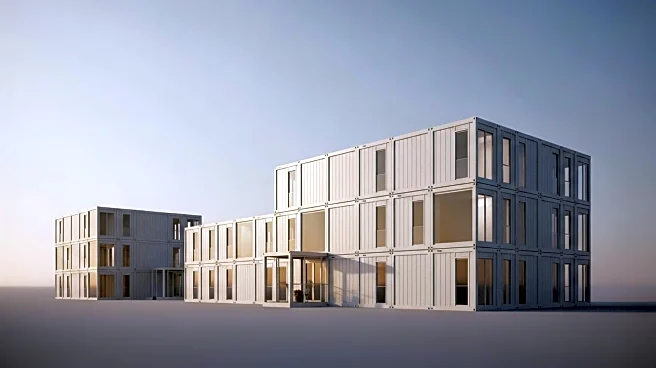What is the story about?
What's Happening?
Duke Street, a private equity firm, has acquired McAvoy, a Northern Ireland-based modular building specialist, from Blantyre Capital. McAvoy, founded in 1972, designs, manufactures, and rents modular buildings across various sectors including healthcare, education, and commercial industries in the UK and Ireland. The acquisition comes after McAvoy returned to profitability, reporting a pre-tax profit of £217,600 for the year ending May 2024, compared to a loss of £712,700 the previous year. The company’s improved performance was largely driven by increased demand for long-term rentals, particularly from schools affected by the RAAC crisis. McAvoy has also secured significant contracts, including appointments to the Scottish Procurement Alliance’s £80m modular framework and the London Construction Programme’s £3bn education framework.
Why It's Important?
The acquisition of McAvoy by Duke Street is significant for the modular building industry, which is experiencing growth due to increased demand for sustainable and efficient construction solutions. McAvoy’s profitability and strategic contracts position it as a key player in the sector, and Duke Street’s investment is expected to support its continued expansion. This move highlights the growing interest of private equity firms in the modular construction market, which offers potential for high returns due to its scalability and adaptability. The acquisition could lead to increased innovation and competitiveness in the industry, benefiting stakeholders such as educational institutions and healthcare facilities that require rapid and cost-effective building solutions.
What's Next?
With Duke Street’s backing, McAvoy is likely to expand its operations and enhance its market presence. The firm’s focus on sustainability and turnkey solutions aligns with current industry trends, potentially attracting more contracts and partnerships. Stakeholders, including government agencies and private sector clients, may anticipate improved service delivery and innovative building solutions. The acquisition may also prompt other private equity firms to explore investments in the modular construction sector, further driving industry growth and development.
Beyond the Headlines
The acquisition underscores the increasing importance of modular construction in addressing infrastructure needs efficiently. As demand for sustainable building solutions rises, modular construction offers a viable alternative to traditional methods, reducing construction time and environmental impact. This trend may lead to broader adoption of modular techniques in various sectors, influencing building standards and practices. Additionally, the focus on sustainability could drive advancements in eco-friendly materials and technologies, contributing to long-term environmental benefits.
















